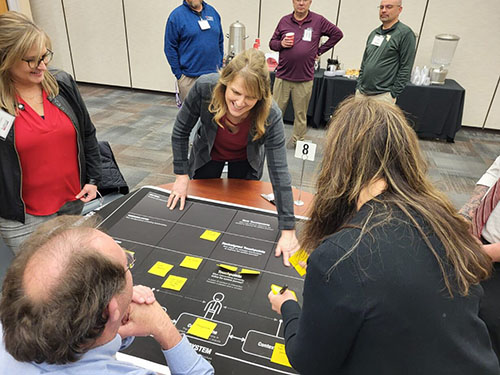NORFOLK, Neb. – Dakota Pawlicki knows about education and the challenges the sector faces with improving access and college graduation rates.
Since Northeast is now offering tuition-free dual credit college classes to high school students, it is looking to expand the opportunities for all students.
Kayla Burdick, Northeast director of Early College Projects, said identifying the services and support needed by all students can be challenging, so Northeast engaged high schools in its service area for the workshop.
Northeast hosted around 60 individuals, including high school administrators and counselors, for what was known as the Early College Access Project (ECAP) Interactive Workshop. It took place Jan. 30-31.
During the first day of the workshop, Pawlicki emphasized the importance of using ideas from other school districts. That’s why it is important for districts to document the processes they are using so they can be replicated by others.
Working in Chicago, Pawlicki said one of the challenges was to raise the graduation rates of college students.
“So we got together, 22 colleges and universities and six advisory partners and we answered two questions: A. What can your institution do to better support your students? And B., What can we do together that we couldn’t do alone?”
Just about everyone has ideas of what they can do as individual institutions, but finding out ways to work collaboratively is a challenge. And not surprisingly, educators often think of “problems and language” when trying to work collaboratively.
“We met months just spinning and spinning,” Pawlicki said, including what seemed like “meeting after meeting.”
And in the end, out of the 22 colleges and universities, it ended up that five or six of the institutions developed the program that made the difference in students’ lives, he said.
Looking back, one of his suggestions would be to make sure that there is a process and a facilitator who leads the efforts.
Burdick discussed Pawlicki’s methods.
“Dakota walked the group through the stakeholder engagement process -- explaining his relationship-based, systems-building approach,” she said.
Part of the workshop included small groups, where participants thought through the processes and identified issues encountered by high school students or high school administrations relating to early college/dual credit students.
The information gathered will help lead a smaller subgroup of stakeholders toward a theme that can then become the focus of the project. Once the theme is determined, a grant proposal will be written to assist with the critical services and support identified by the stakeholders.
“(Northeast) would like to thank all the area schools who had representation at this workshop. We look forward to continuing this work throughout the coming months,” Burdick said.
ECAP Workshop cutline
Merri Schneider (from left, then clockwise), director of Northeast’s O'Neill Extended Campus; Cathy Thompson, Battle Creek Public Schools counselor; Pam Wieser, Norfolk Catholic High School counselor; and Alan Gottula, Laurel-Concord-Coleridge High School counselor; shared a laugh during a small groups exercise. (Northeast Community College)
###

